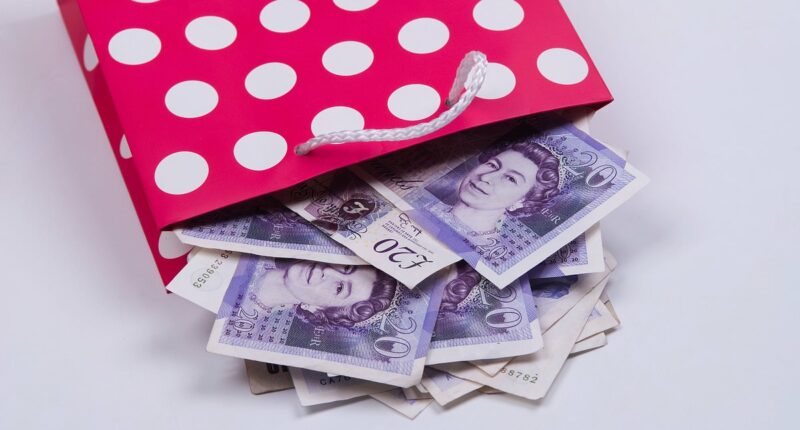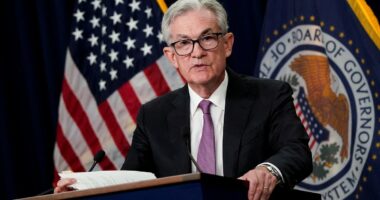Share this @internewscast.com
The current stock market landscape might seem unwelcoming, especially with recent concerns about a potential bubble in U.S. tech stocks. However, those fears have diminished somewhat after semiconductor giant Nvidia reported results that exceeded expectations.
Despite this reprieve, skepticism persists. In light of these uncertainties, dividends from UK companies could offer a comforting alternative for investors.
While some observers continue to view the valuations of Nvidia and other Silicon Valley firms embroiled in the artificial intelligence (AI) race as overly inflated, UK stocks are trading at much lower valuations.
The FTSE 100 is on track to have its best year since 2009, with companies within the prestigious index projected to distribute around £80 billion in dividends to their shareholders this year.
Although AI sector leaders are generating substantial profits, they tend to maintain conservative dividend policies.
In comparison, UK firms like insurer Aviva and asset manager M&G are offering dividend yields exceeding 6 percent, significantly higher than the 4.54 percent yield on a ten-year government bond, or ‘gilt’.

Cashing in: The FTSE 100 seems headed for its best year since 2009, and members of the blue-chip index are forecast to pay out about £80billion in dividends to shareholders this year
Moreover, FTSE 100 constituents are planning £50billion in share buybacks this year. When a company buys back its own shares, this reduces the number in issue, which should boost the price.
Such has been unease about the Budget and its aftermath that it may seem safer to take shelter in deposit accounts – especially since the savings safety net will be extended to £120,000 next month.
But, while a best-buy instant access account pays 4.5 per cent at present, this will be trimmed if the base rate is cut next month, as forecast.
Also, Budget trepidation may be overdone. Ken Wotton, manager of the Strategic Equity Capital trust, said: ‘If policy turns out even slightly more growth-friendly than feared, that alone could materially lift sentiment and share prices. UK shares are priced for catastrophe. When expectations are this low, the UK only needs to clear a small hurdle to surprise on the upside.’
Dividends are not guaranteed. They can be trimmed or even suspended. But at nervous times like these, a decent dividend payout takes on a new allure: small wins count.
It’s also time to dispel the notion that dividends are only for those seeking an income. As Barclays explains, reinvesting dividends ‘can become a powerful driver of wealth through compounding’.
The bank says that, over the past decade, the FTSE 100 has provided a 15 per cent gain for investors. But this turns into 68 per cent with dividends reinvested, which platforms such as AJ Bell and Hargreaves Lansdown make easy to do. Here’s what you need to know.

HAPPY HUNTING GROUNDS
The property and insurance sectors can prove lucrative if you like an above-average yield.
London Metric is a real estate investment trust (Reit) which owns logistics warehouses and retail parks.
The shares yield 6.54 per cent and are rated a ‘buy’ by analysts. This is thanks to ‘continuous portfolio improvement and value creation’, as Andrew Saunders, of Shore Capital, puts it. Asset manager M&G’s yield is 7.47 per cent. Its shares are up by 32 per cent this year to 263p, following takeover talk, a tie-in with a Japanese insurer – and the announcement of a
progressive dividend policy. This is a commitment to continue to raise the payout, and the reason why analysts reckon the shares could advance to as high as 342p.
Aviva is also being open-handed to shareholders with a 6.03 per cent yield. Six of the eight analysts that follow the stock rate the shares a ‘buy’. The rest consider them to be a ‘hold’.
Legal & General shares have failed to thrill this year, but the yield is an enticing 9.28 per cent, explaining why analysts consider them a ‘hold’. Phoenix is another insurance star with an 8.42 per cent yield. Analysts consider the shares to be a ‘hold’ at 660p.
The dividend yield from Vodafone (led by Margherita Della Valle) is 4.53 per cent, after a change in strategy. Until recently, the telecoms group had not hiked its payout since 2018.
The company is also executing a €4billion (£3.46billion) buyback programme. Shares – which analysts rate a ‘hold’ – have also soared this year, up 36 per cent at 90p.

Change in strategy: The dividend yield from Vodafone, led by Margherita Della Valle, is 4.53 per cent
DOUBLE DIGIT RETURNS
Imperial Brands, maker of cigarettes and ‘next generation’ products such as oral nicotine and vapes, has distributed £10bn over the past five years to shareholders. Through a mix of dividends and buybacks, it now provides a distribution yield of 10 per cent.
The shares have soared by 26 per cent this year to 3224p. Analysts are forecasting further growth with an average target price of 3319p.
An eye-catching dividend can be a sign of corporate confidence. But it can be a red flag, too, indicating problems at the company and a tumbling share price, as is the case at embattled advertising giant WPP. WPP’s yield may be 10.35 per cent, but it has been losing clients and is struggling with the challenge that AI poses.
DIVIDEND HEROES
A number of investment trusts are ‘dividend heroes’ with more than six decades’ worth of uninterrupted dividend growth. City of London (where I am an investor) is one. Its portfolio includes NatWest and Tesco. Artemis Income is another option.
If you want to expand your dividend search to include smaller and medium-sized British businesses, Darius McDermott of FundCalibre cites Schroder Income Growth, which has a strong tilt towards UK mid-cap stocks, and the VT Tyndall Unconstrained UK Income Fund.
BUDGET THREATS
Chancellor Rachel Reeves could spoil the dividend party fun in the Budget.
Earlier this month it was thought that she would not make the banking levy more punitive. This is a tax on banks’ balance sheets. It is now said, however, that Reeves could raise the corporation tax surcharge to which these institutions are subject.
These fears could be outweighed, however, by the attractive yields of 4.05 per cent at Lloyds and 5.49 per cent at NatWest. Most analysts think that Lloyds is a ‘hold’ or set to outperform the sector. Most who follow NatWest say it’s a ‘buy’.
Whatever the source of dividends, Reeves could decide to tax them more heavily, perhaps abolishing the £500 tax-free allowance – and raising the rates of tax. Basic rate taxpayers pay 8.75 per cent, which rises to 33.75 per cent for higher rate taxpayers and to 39.35 per cent for additional rate taxpayers. The basic rate could go up to 16.5 per cent.
On other hand, Reeves may incentivise the buying of London-listed shares by overhauling the rules for Isas in which shares escape tax.
But will the Chancellor have the decency to do something to promote investing?
We will know next week.
DIY INVESTING PLATFORMS
AJ Bell

AJ Bell
Easy investing and ready-made portfolios
Hargreaves Lansdown

Hargreaves Lansdown
Free fund dealing and investment ideas
interactive investor

interactive investor
Flat-fee investing from £4.99 per month
Freetrade

Freetrade
Investing Isa now free on basic plan
Trading 212
Trading 212
Free share dealing and no account fee
Affiliate links: If you take out a product This is Money may earn a commission. These deals are chosen by our editorial team, as we think they are worth highlighting. This does not affect our editorial independence.
Compare the best investing account for you











